Once we have set an objective for cultivating the mind, we must ask ourselves: “How do we cultivate our minds? How do we purify it?” The answer depends on your mind’s ability to comprehend – that is called “enlightenment”. To get enlightened is to understand.
We always talk about the desire to become enlightened. However, with the principles already laid out clearly – the law of cause and effect, cyclical rebirths, karmic conditions and destiny –what else are we meant to awaken to? In reality, everything we encounter in our daily lives –such as the moon, a flower, the grass or a tree – provides us with opportunities to become enlightened and deepen our understanding of life. Enlightenment is a cyclical process in which we practise the teachings of the Buddha-dharma and apply it to our everyday lives. And from the experiences of doing so, we gain a deeper understanding of the Buddha-dharma. Then, we reapply what we have learned back into our everyday lives – and the process repeats itself. This is similar to preparing for a test, where, in doing our exercises, we constantly and repetitively apply the guiding principles. From these exercises, we keep learning to master the basic concepts until we reach a level of proficiency such that we are freely able to put the theory into practice. In the process of cultivation, each time we apply the Buddha-dharma correctly, the level of our spirituality will be elevated accordingly. Nevertheless, even if we did well on nine consecutive attempts but erred on the tenth, all previous efforts will have come to naught. That’s why cultivation of the mind is like treading on thin ice.
修心的目标有了,那么修心怎么修,怎么擦拭我的心?这要靠心的理解来实现——悟。
悟就是想通,我们总是说要悟,可道理都摆在那,轮回因果,缘分命运,还有什么可悟的哪?实际上,明月飞花,一草一木无不带来悟的契机,生活中的每一天每件事都有可能让我们领会更多,悟就是将佛法应用到生活中去再从生活中体会出佛法的一个反复练习的过程,就是我们在准备考试的过程中反复应用基本纲领反复做练习题再从练习中掌握基本纲领直到熟练掌握,应用自如的过程。修心路上的每一次正确应用佛法,心境就提升一分,同时又可能前九次全对,但第十次错了,就可能导致修行前功尽弃,所以才说修心路上“如履薄冰”。
Many fellow practitioners have very thoroughly studied the Buddhist teachings expounded by the Master, gaining an in-depth grasp of his teachings and cultivating diligently. This is an encouraging sign, indicating that practitioners fully appreciate the unique excellence of this Buddhist practice. However, in light of the many questions posted online and considering how practitioners handle interpersonal relationships, it is evident that many are still at the stage of struggling to repay their karmic debts. These practitioners are yet to grasp that the Buddha-dharma is closely intertwined with our daily lives, and that learning about Buddhism begins with learning about the basic principles of being a moral person. Although some may seem to have tamed their temper through their efforts in reciting Buddhist scriptures, they have done no self-reflection or even tried proactively to identify and correct their shortcomings. In other words, they have yet to take the initiative to apply Buddhist teachings in their daily lives, and to practise what they have learned personally. For example, when it comes to cultivating the Buddhist teachings of “Morality (Precepts), Concentration and Wisdom”, many people still do not understand what precepts are to be observed, or even why it is necessary to observe the precepts in the first place. Why it is that observing the precepts will give rise to concentration? What does concentration mean? These are questions we must get to the bottom of. Similarly, we need to fully comprehend the many conclusions derived from our predecessors’ past experiences, and identify the basic principles behind these conclusions. Only then will we be able to understand why our predecessors reached these conclusions. For example, why is it that we are able to practise “diligent cultivation” when we practise “forbearance in the face of humiliation”? On which theory is that based? Why is the concept of “non-self” given so much emphasis, and what is its purpose? Not only should you gain an understanding of the theories, you also need to put them into practice. You cannot just apply the theories mechanically – you need to fully understand them so that you can draw inferences from other cases. This is similar to our study of mathematics, and the application of those mathematical theorems.
有很多同修对台长的“说法”研究得非常仔细,理解得非常透彻,修得非常精进,这是好的现象,说明大家认识到这个法门的殊胜之处。但是从网上问的问题和平时的待人接物上可以看出,很多人现在还处于还债的阶段,还没有认识到佛法即人生,学佛先学做人的基本道理。虽然因为念经的原因,脾气上有了改进,但并没有主观上开始反省自心,主动地找毛病改正品行,也就是说佛法还没有被应用到生活中去,还没有把佛法主动地应用到自己身上。比如说“戒定慧”,有多少人仍不明白为什么要戒,戒什么,怎么戒了就能定?为什么要定?定什么?这些都是心中要明白的问题。同样很多我们平时耳熟能详的一些前人总结的经验,也要从中悟出它的原理,它依据佛法的哪个基本定律,这样才能明白前人为什么这么说。比如说,为什么“忍辱能精进”,依据哪一原理?为什么要这么强调“无我”,有什么作用?等等,不仅知道这句话,也能按着做,不能只是简单地机械地照搬套用,只有理解了原理才能举一反三,真正明白真正会应用,这一点和我们学习数学应用定律没有什么区别。
Therefore, enlightenment is not something distant nor abstract. In fact, in our daily practice of Buddhism, we are gradually being awakened without even knowing it – we get to learn how to perform recitations of Buddhist scriptures, and understand how performing recitations can change our lives for the better. The next step for a Buddhist practitioner is to systematically and consciously practise Buddhism in order to attain enlightenment. One should be more inquisitive and ask more questions in order to understand more guiding principles. Buddhist practitioners have a good understanding of these guiding principles so that they do not dare to commit bad deeds – just like people who know the law do not dare to commit offences.
所以“悟”并不是那么遥远抽象,在每天的学佛中,实际上我们都已经在不知不觉的情况下开悟:怎么念经?念经怎么就会变好?小房子是怎么应用的等等,接下来就是要系统地有意识地悟,想更多的“为什么”从而明白更多的道理。修心的人不敢做坏事就跟懂法的人不敢违法乱纪一样,因为他明白道理。
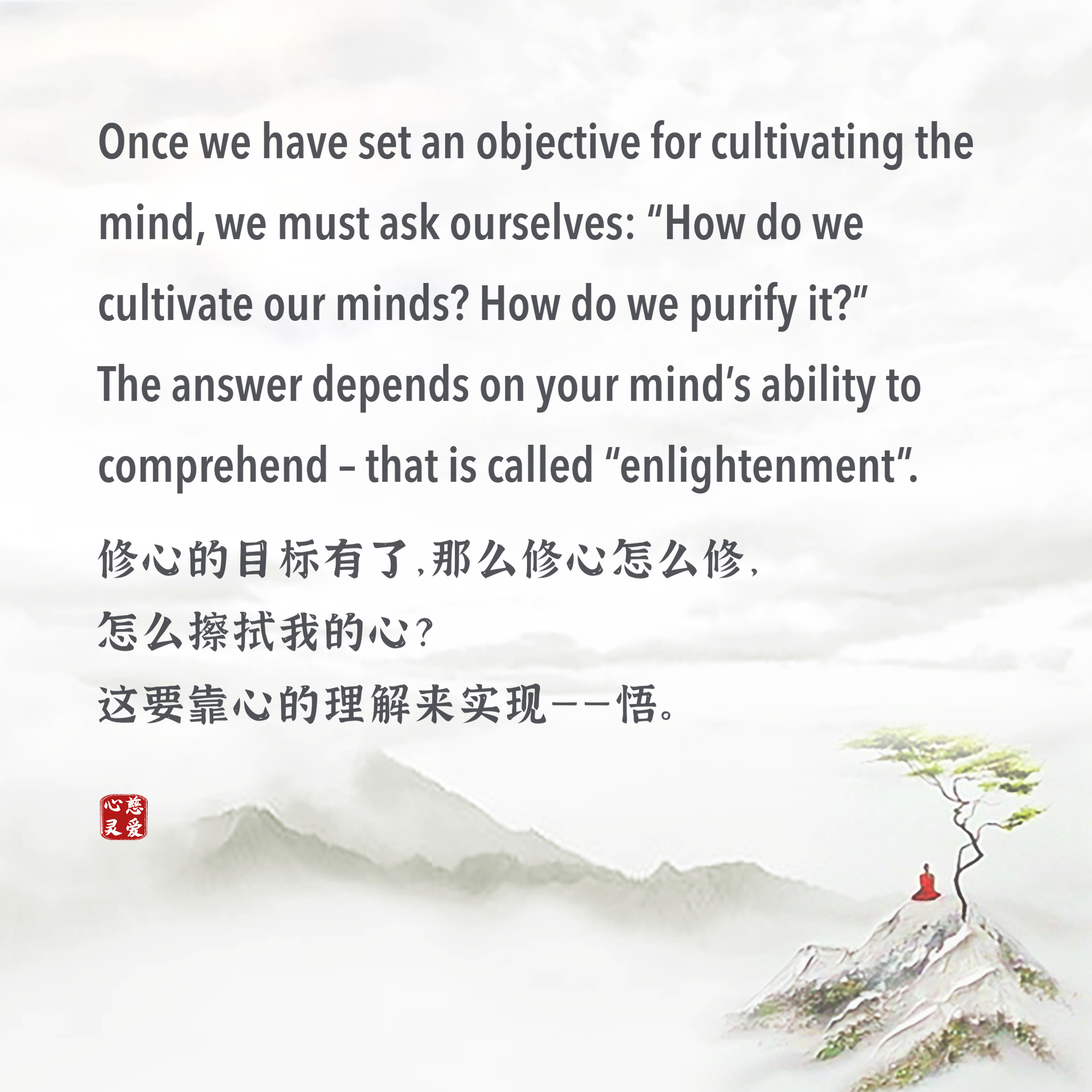
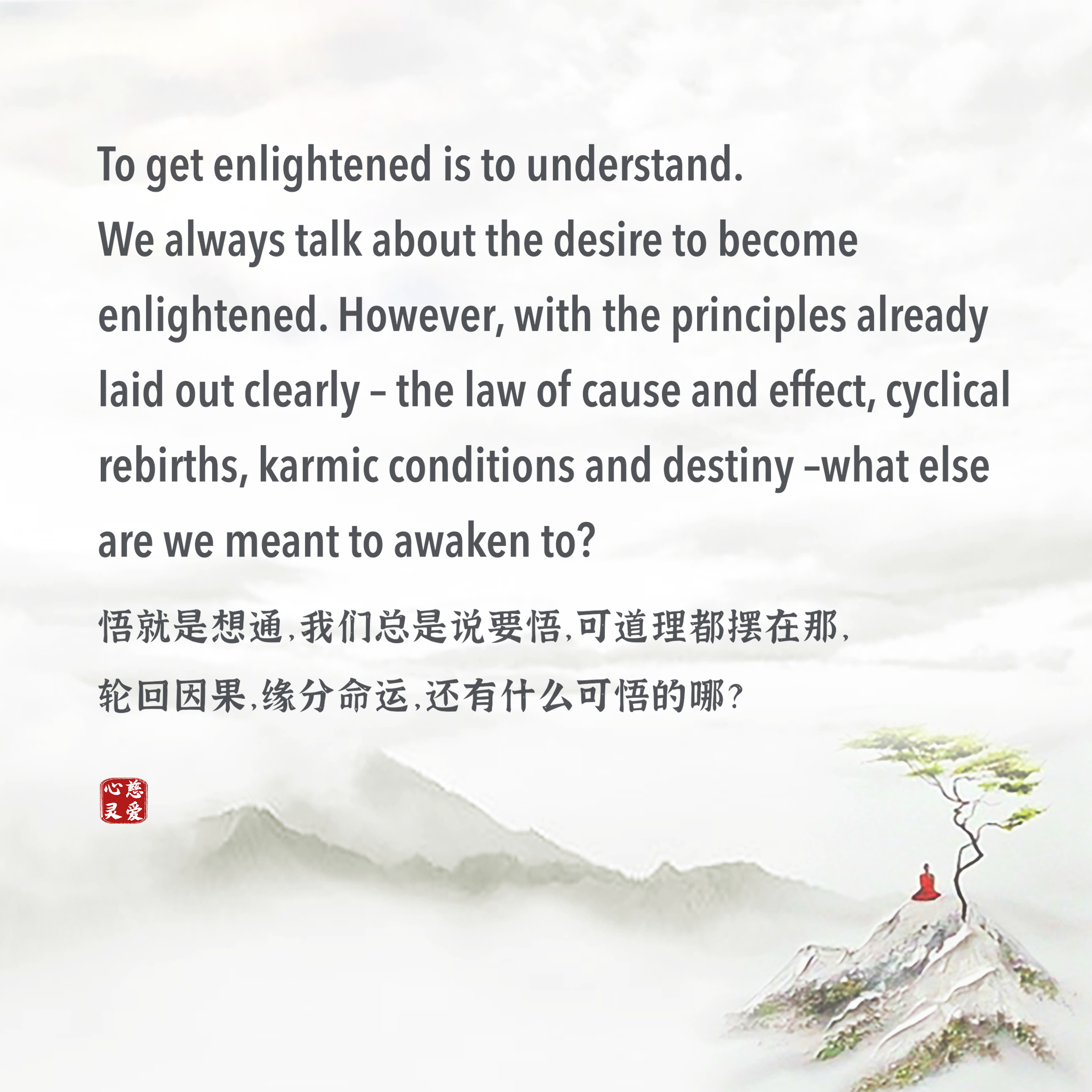

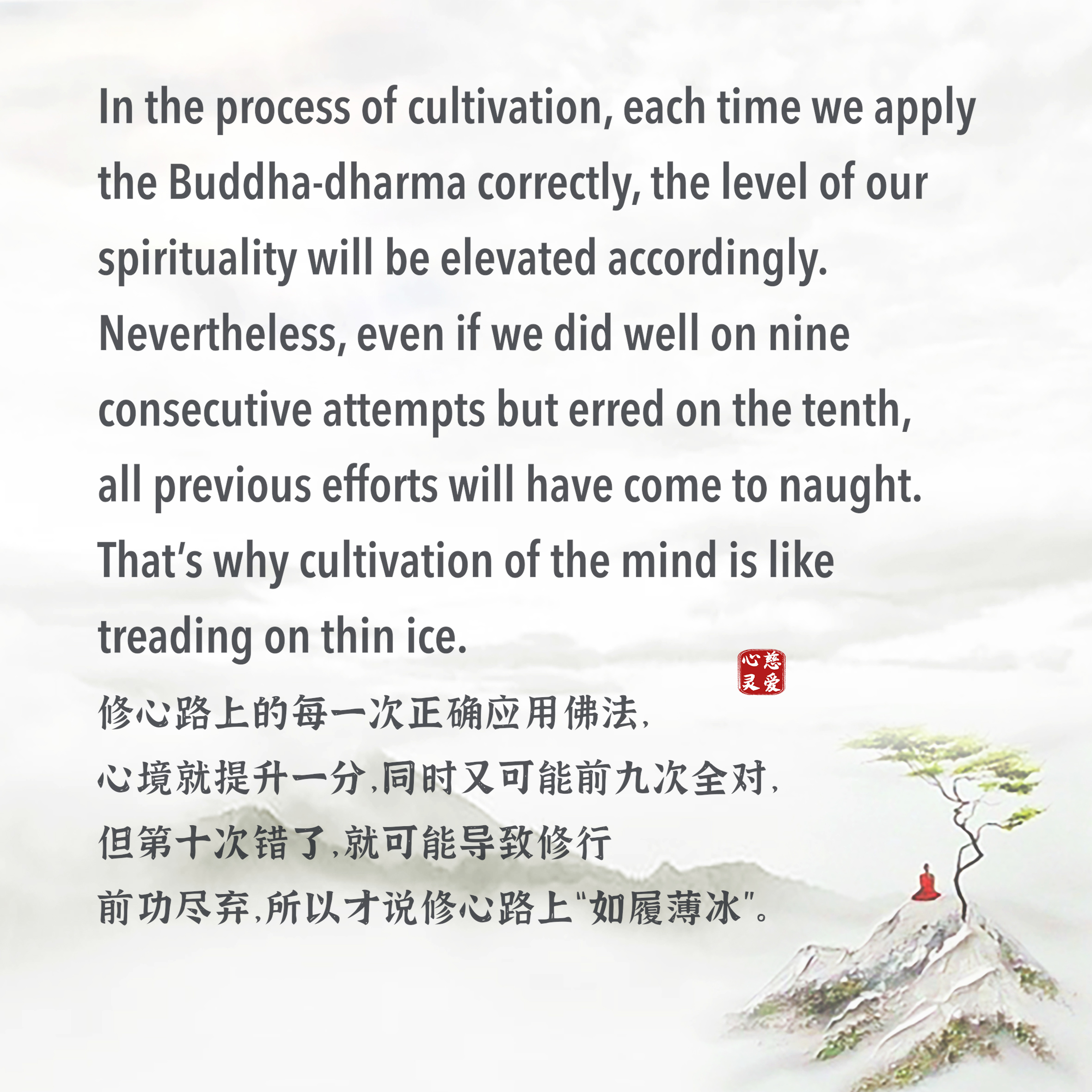
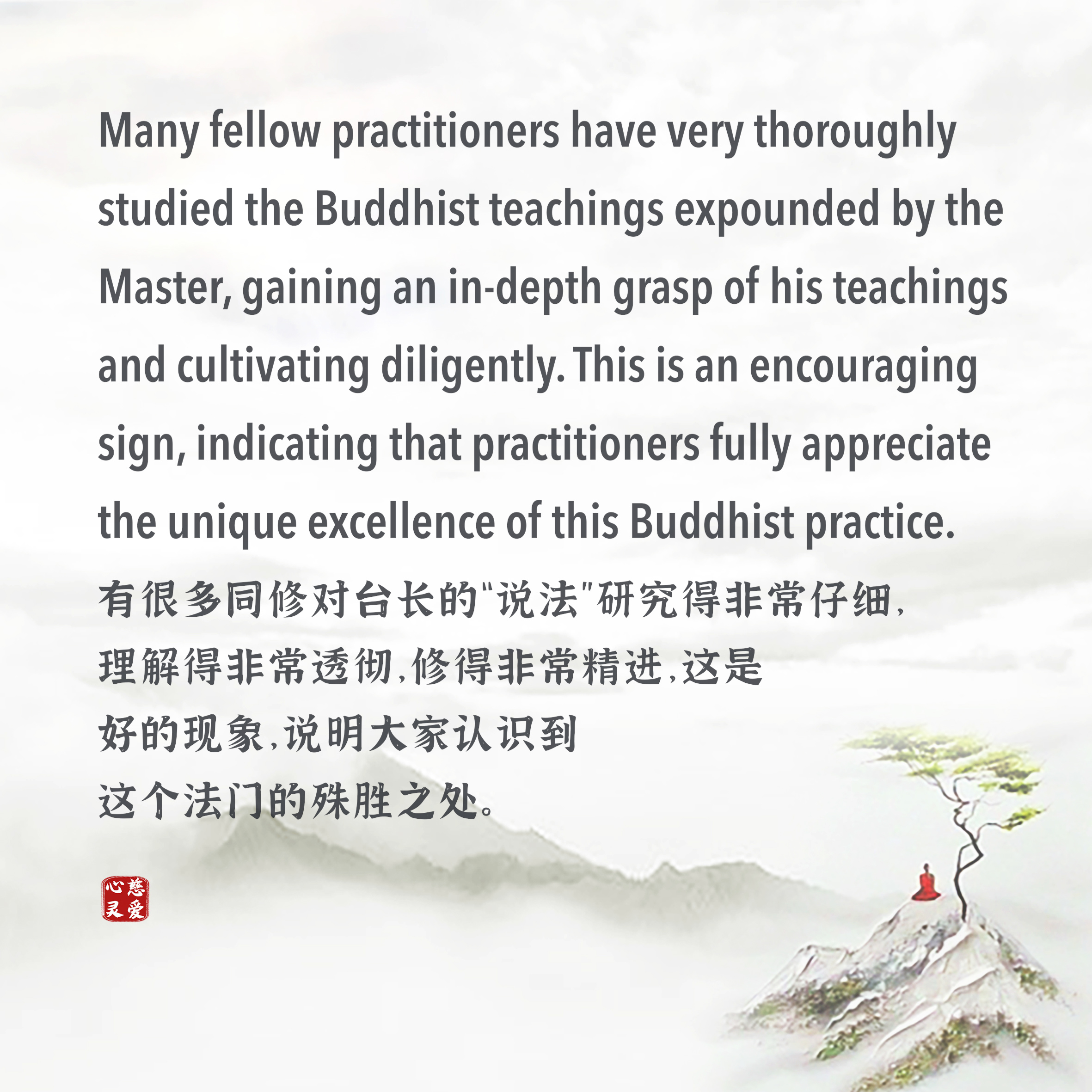
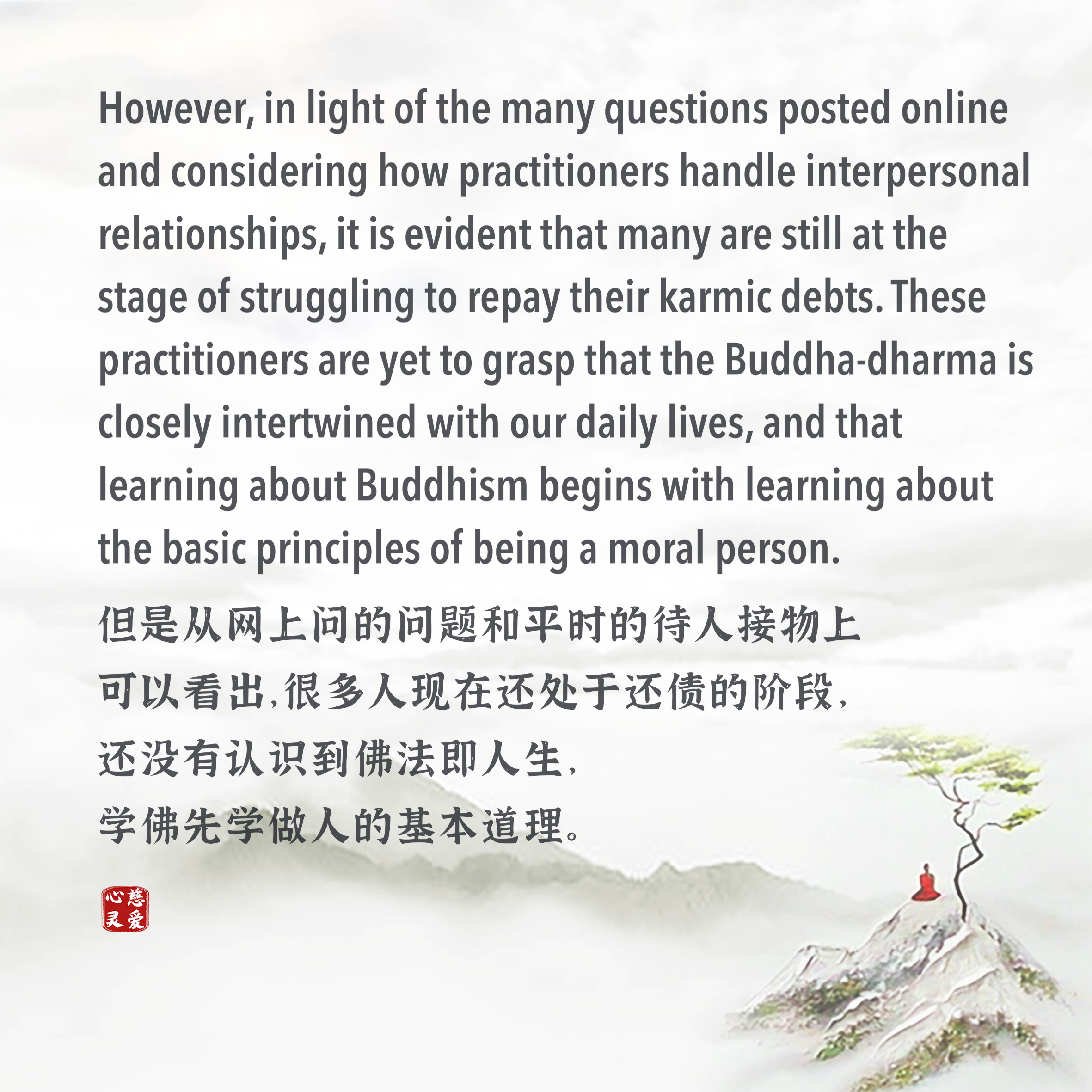
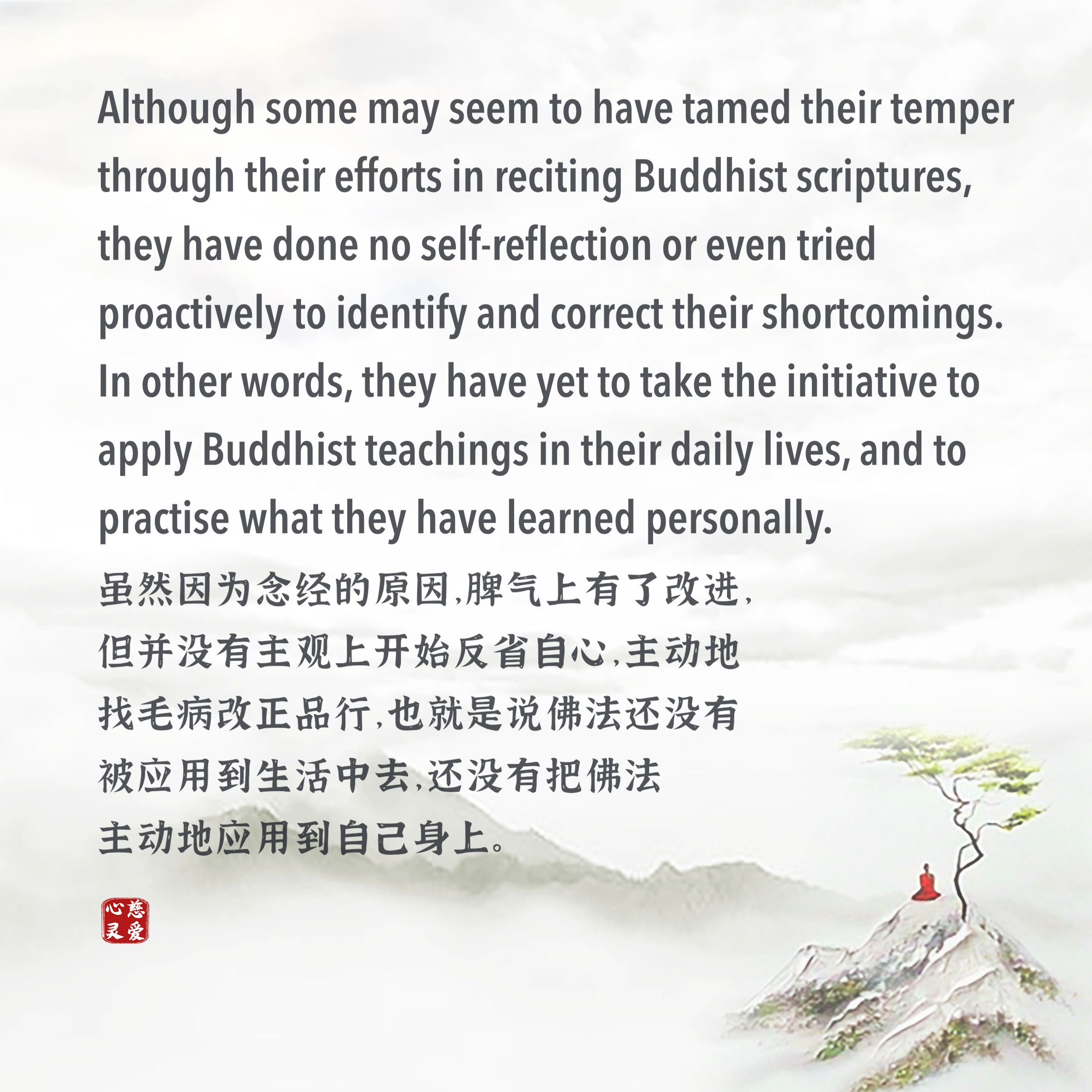
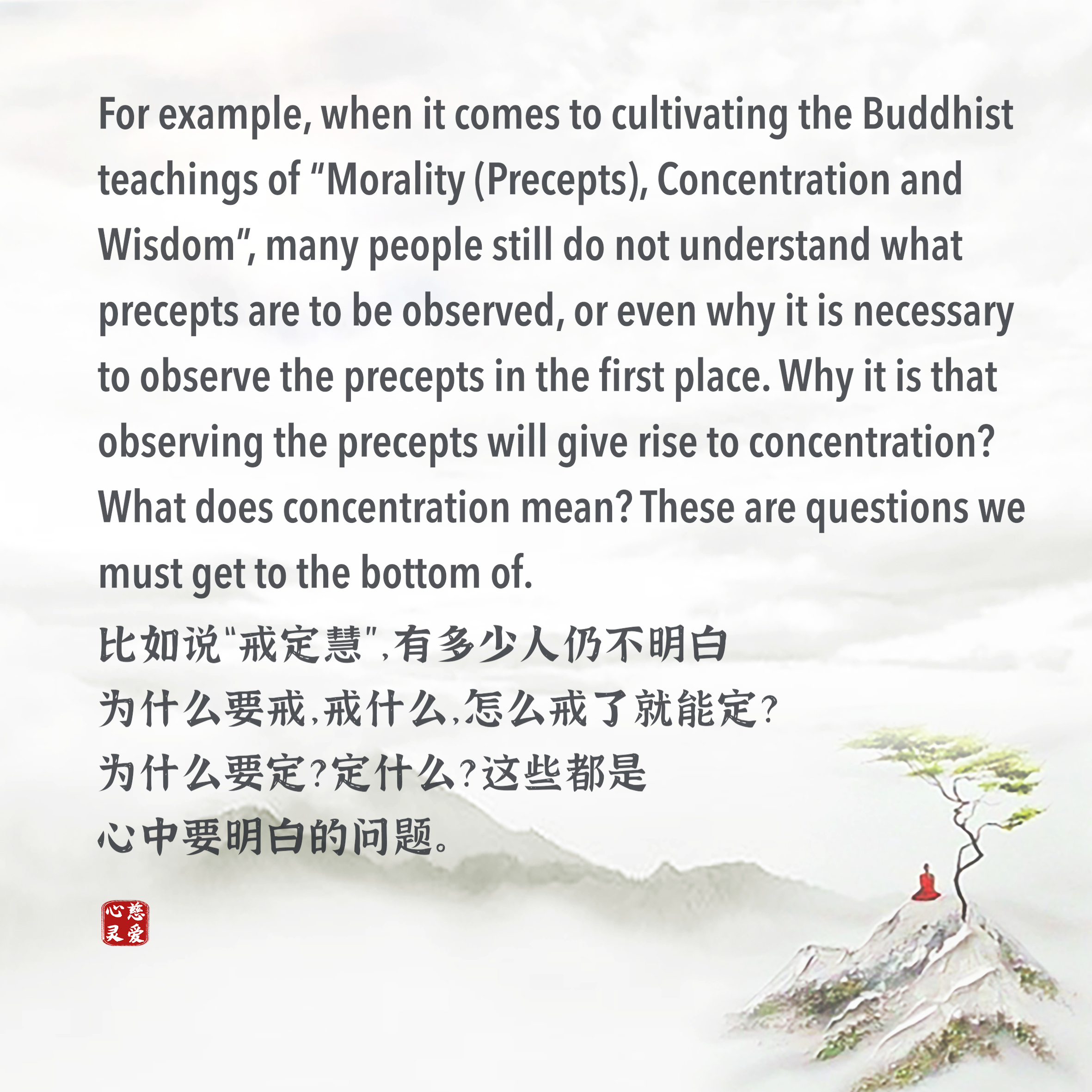
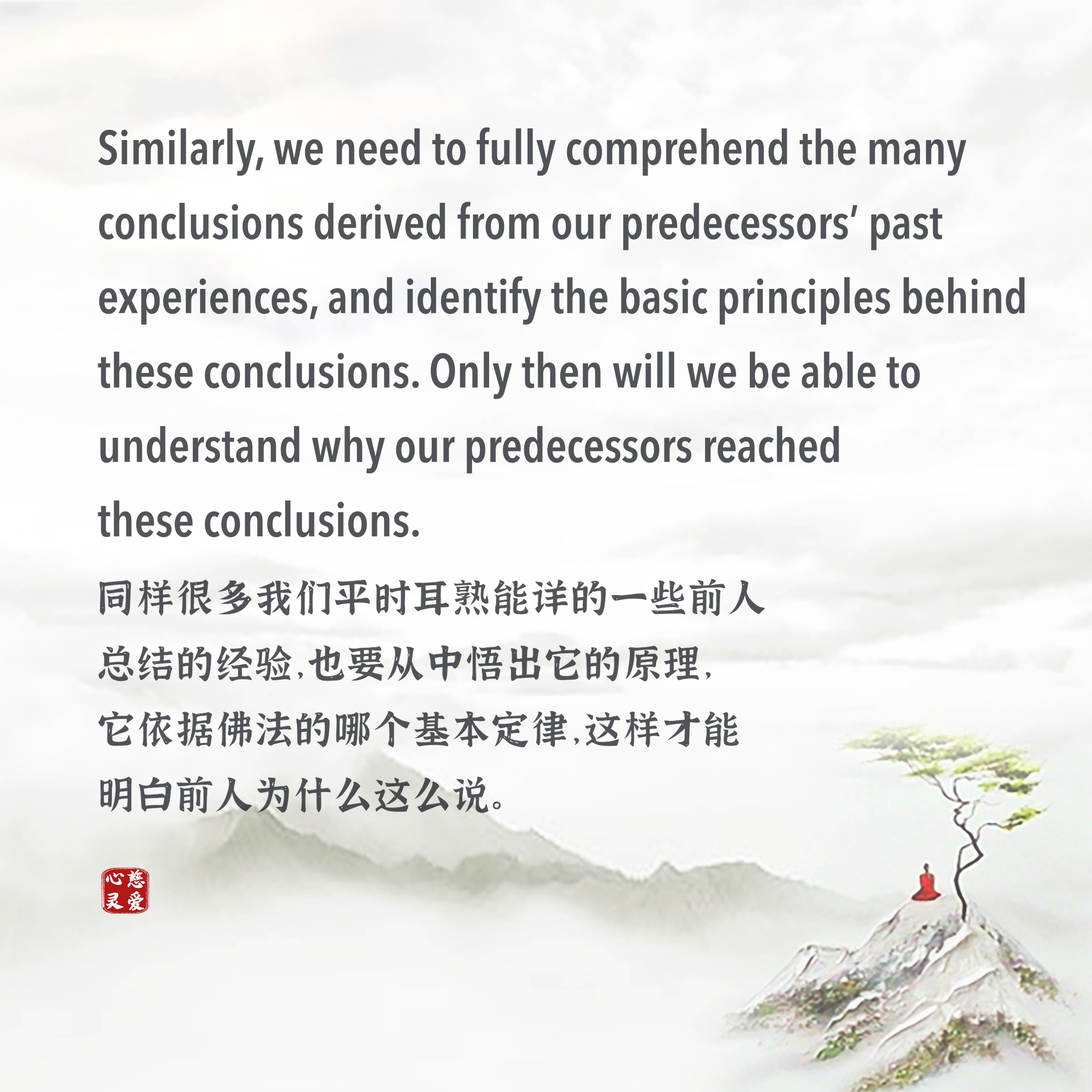
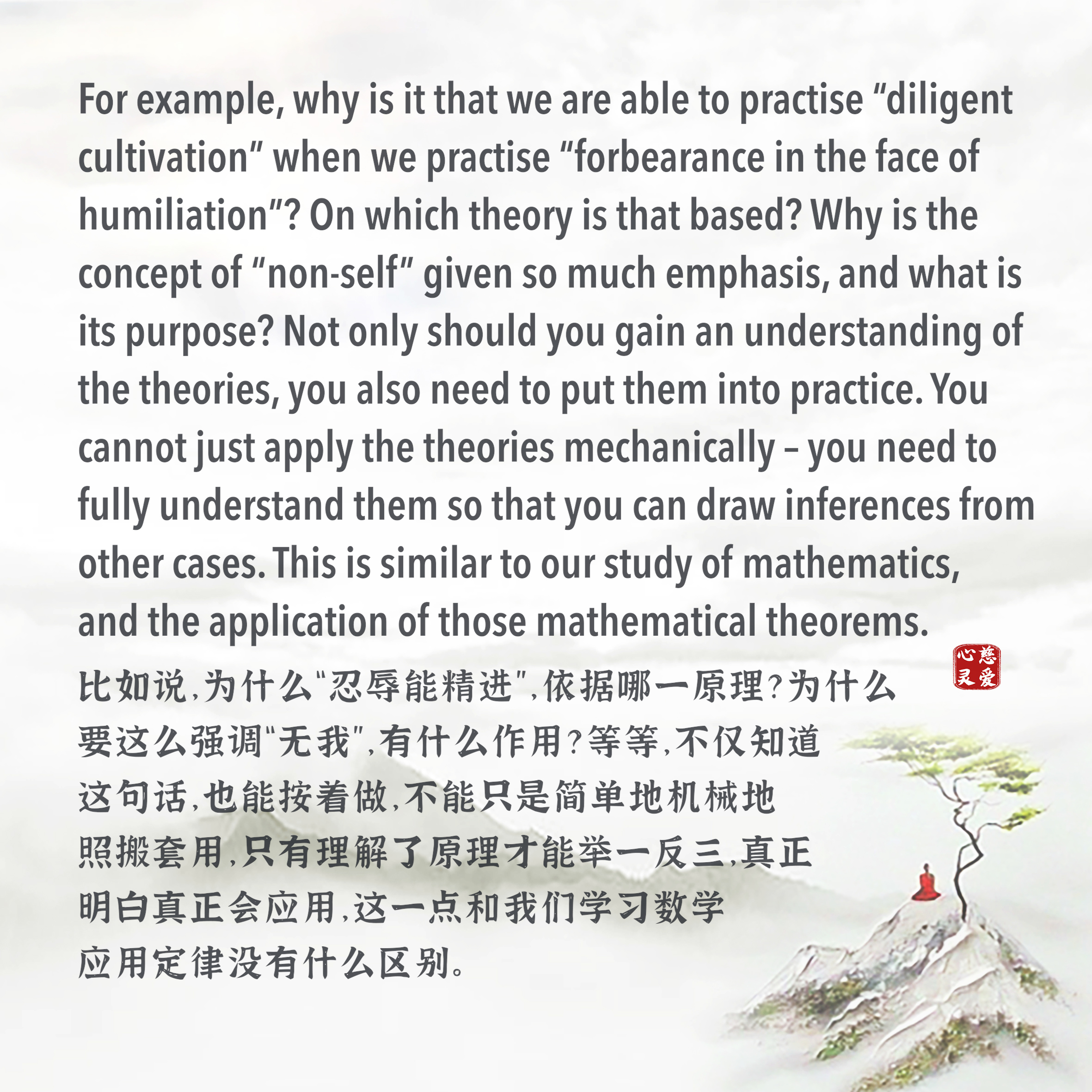
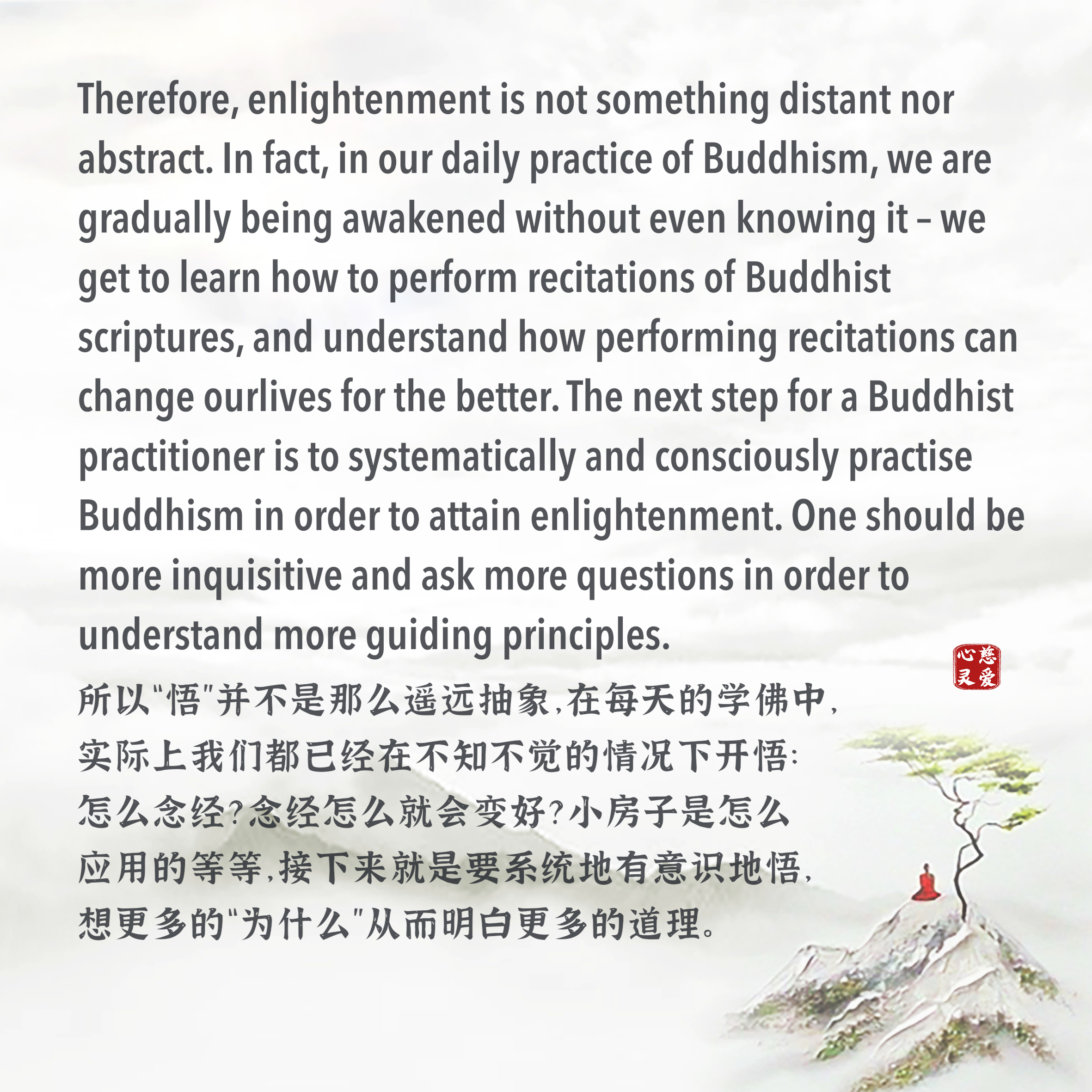
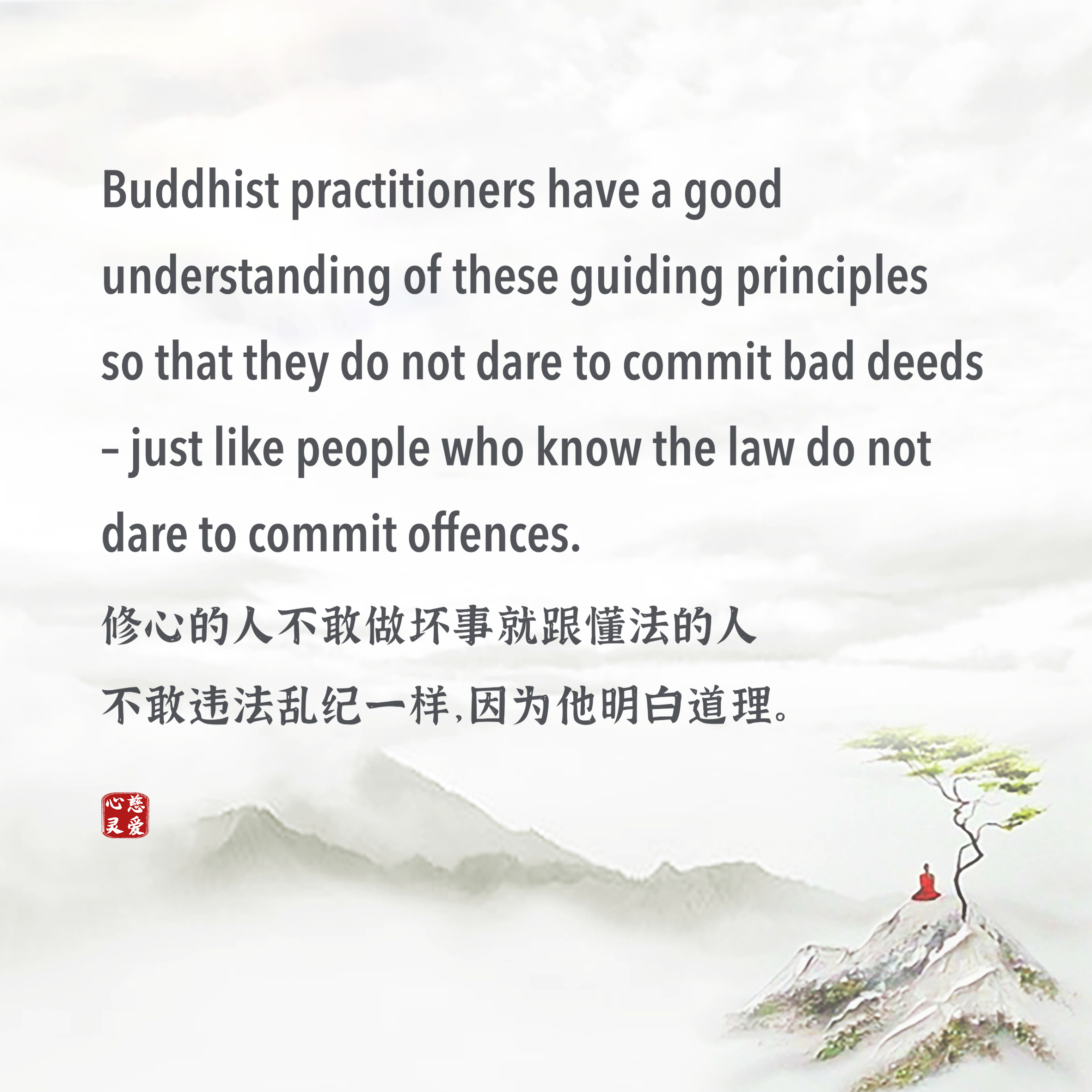
所以真正的无上正等正觉,也就是究竟圆满的智慧,就是让你们怎么样找到一条真正的路。
修心的目标有了,那么修心怎么修,怎么擦拭我的心?这要靠心的理解来实现——悟。